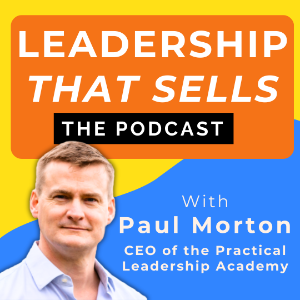
Leadership that sells
Education Podcasts
Welcome to Leadership That Sells, the podcast for sales managers and leaders who want to inspire, serve, and unlock the greatness in their teams. Leading a sales team is one of the most visible and high-pressure roles out there. Your team’s results are on display for everyone to see. But leadership isn’t just about hitting numbers—it’s about selling people on their own potential and helping them thrive. Join Paul Morton, CEO of Practical Leadership Academy, as he explores how servant leadership and influence can transform the way you lead. With practical insights and real-world stories, you’ll discover how to build trust, drive results, and support your team in one of the most challenging and rewarding leadership roles. If you’re ready to lead with purpose, inspire action, and create a culture of success, this podcast is for you.
Location:
United Kingdom
Genres:
Education Podcasts
Description:
Welcome to Leadership That Sells, the podcast for sales managers and leaders who want to inspire, serve, and unlock the greatness in their teams. Leading a sales team is one of the most visible and high-pressure roles out there. Your team’s results are on display for everyone to see. But leadership isn’t just about hitting numbers—it’s about selling people on their own potential and helping them thrive. Join Paul Morton, CEO of Practical Leadership Academy, as he explores how servant leadership and influence can transform the way you lead. With practical insights and real-world stories, you’ll discover how to build trust, drive results, and support your team in one of the most challenging and rewarding leadership roles. If you’re ready to lead with purpose, inspire action, and create a culture of success, this podcast is for you.
Language:
English
Contact:
+447775938904
Email:
paulwmorton@gmail.com
109. How to Lead Without Letting Blind Spots Win - with Kevin McCarthy
Duración:00:36:32
108. How to Lead Sales Through Scale and Change - with Andy Reid
Duración:00:23:56
107. How to Build a Scalable Sales Pipeline That Wins - with Gerry Hill
Duración:00:30:41
106. How Sales Leaders Can Consistently Hire Top-Performing Sales people - with David Revell
Duración:00:32:42
105. How sales people can overcome impostor syndrome - with Markus Neukom
Duración:00:28:11
104. How to lead like a beehive: collaboration, clarity and cycles - with Philip Atkinson
Duración:00:26:53
103. How to lead through curveballs with confidence - with Joelle Kaufman
Duración:00:31:23
102. How to build scalable success with systems (and still live your dream) - with Ral West
Duración:00:22:01
101. How to Turn High-Stakes Presentations into Unforgettable Theatrical Experiences - with Carmen Sederino
Duración:00:31:54
100. How to lead by being on their side - with Andrea Morton (Paul's mum)
Duración:00:55:09
99. How to lead through big transitions without losing your people - with Sylvana Rochet
Duración:00:30:21
98. How to take over a team and turn it into a high-performing system - with Carl Sharperson Jr.
Duración:00:41:50
97. How to spot hidden talent and build teams that scale fast - with Dmytro Tymoshchuk
Duración:00:48:38
96. How to successfully sell your business without losing your mind - with Christine Nicholson
Duración:00:35:15
95. How to create pull energy to accelerate your team's growth - with Jack Cohen
Duración:00:36:34
94. How to adapt your leadership to any business context - with Torben Noerby
Duración:00:28:57
93. How to Build a Durable Business Engine for Lasting Success - with Garrett Delph
Duración:00:31:16
92. How to Build a Thriving Workplace Culture - with Kristy Pretzinger
Duración:00:33:26
91. How to find and land your ideal sales leadership role - with Richard Washington
Duración:00:32:41
90. How to Build a Lasting Legacy - with Charlie Leichtweis
Duración:00:29:04